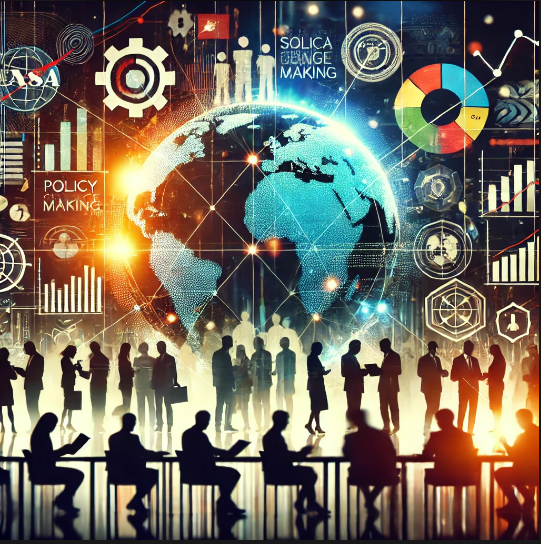Introduction
Non-Governmental Organizations (NGOs) play a crucial role in shaping public policies, advocating for social causes, and influencing governance at local, national, and international levels. They act as mediators between the government and the public, ensuring that policies are inclusive, sustainable, and aligned with the needs of marginalized communities.
In modern governance, policy-making is no longer limited to governments and bureaucrats; instead, NGOs have emerged as powerful stakeholders that contribute through research, advocacy, awareness campaigns, capacity building, and direct engagement with policymakers. This article explores the role of NGOs in policy-making, their influence, challenges, and the way forward.
Understanding Policy Making
What is Policy Making?
Policy-making is the process by which governments develop laws, regulations, and programs to address societal issues. It involves problem identification, research, drafting, consultation, implementation, and evaluation.
Key Stakeholders in Policy Making
- Government Bodies – Legislatures, ministries, regulatory authorities.
- Bureaucracy – Civil servants and government officials.
- Private Sector – Corporations and business groups.
- NGOs and Civil Society Organizations (CSOs) – Advocacy groups, think tanks, and grassroots movements.
- Media – Plays a role in shaping public opinion and policy discourse.
- International Organizations – UN, WHO, World Bank, IMF, etc.
Among these, NGOs have gained prominence as key policy influencers, ensuring that policies are inclusive, people-centric, and aligned with sustainable development goals (SDGs).
How NGOs Influence Policy Making
1. Advocacy and Lobbying
- NGOs act as pressure groups by engaging with lawmakers and policymakers to introduce reforms.
- They organize campaigns, petitions, and protests to bring public issues to the government’s attention.
- Example: Greenpeace actively lobbies for environmental protection policies globally.
2. Research and Policy Analysis
- NGOs conduct in-depth research, data collection, and impact assessments to provide evidence-based recommendations.
- They publish policy briefs, white papers, and case studies, helping governments design fact-based policies.
- Example: Oxfam researches income inequality and advises governments on inclusive economic policies.
3. Bridging the Gap Between Government and Citizens
- NGOs act as intermediaries between policymakers and the public, ensuring that marginalized communities have a voice.
- They facilitate community consultations and public hearings, ensuring that policies reflect ground realities.
- Example: Amnesty International works to bring human rights violations to the government’s notice.
4. Capacity Building and Training
- NGOs provide training and skill development for government officials, communities, and organizations to improve policy implementation.
- They help build institutional frameworks for effective governance.
- Example: Transparency International educates governments on anti-corruption mechanisms.
5. Grassroots Mobilization
- NGOs mobilize communities to participate in policy discussions and governance.
- They use social movements and grassroots activism to push for legal and administrative changes.
- Example: Self-Employed Women’s Association (SEWA) in India advocates for women’s labor rights.
6. Litigation and Legal Interventions
- NGOs use public interest litigation (PILs) and legal mechanisms to challenge unjust policies and advocate for legal reforms.
- They provide legal aid and support to marginalized communities.
- Example: Center for Reproductive Rights works on legal advocacy for women’s health rights.
7. Disaster Relief and Crisis Management
- During crises, NGOs provide humanitarian aid, rehabilitation, and policy recommendations for better disaster management.
- Example: Red Cross and Red Crescent Societies influence global disaster response policies.
Case Studies: NGOs Impacting Policy Making
1. Role of NGOs in Environmental Policies
- The World Wildlife Fund (WWF) played a significant role in influencing climate policies, conservation laws, and the Paris Agreement.
- Greenpeace successfully pushed for policies on deforestation, renewable energy, and plastic waste reduction.
2. NGOs and Human Rights Policies
- Amnesty International and Human Rights Watch consistently advocate for policy changes in human rights protection, refugee rights, and anti-discrimination laws.
- Their reports often lead to policy reforms and international interventions in conflict zones.
3. NGOs in Health Policy Making
- Médecins Sans Frontières (Doctors Without Borders) played a key role in shaping global health policies during epidemics like Ebola and COVID-19.
- GAVI, the Vaccine Alliance, has influenced immunization policies in developing countries.
4. NGOs and Social Welfare Policies
- Oxfam and ActionAid advocate for poverty eradication policies, fair wages, and gender equality measures.
- Pratham has played a role in influencing education policies in India.
Challenges Faced by NGOs in Policy Making
1. Political Resistance
- Many governments view NGOs as opponents rather than partners in governance.
- Authoritarian regimes restrict NGO activities, limiting their influence.
2. Financial Constraints
- NGOs often rely on donations and grants, making them financially vulnerable.
- Governments may restrict foreign funding, affecting their operations.
3. Bureaucratic Barriers
- Lengthy approval processes and government red tape slow down policy engagement.
- NGOs face restrictions in participating in policy discussions.
4. Misinformation and Public Perception
- Some NGOs are accused of being influenced by foreign agendas or political biases.
- Misinformation campaigns often discredit NGO efforts.
5. Legal Restrictions
- Some countries have laws that restrict NGO activities and advocacy efforts.
- Example: India’s FCRA regulations limit foreign funding for NGOs.
Way Forward: Strengthening NGO Participation in Policy Making
1. Encouraging Government-NGO Collaboration
- Governments should create institutional mechanisms for NGOs to participate in policy consultations.
- Example: Setting up multi-stakeholder policy forums.
2. Ensuring Financial Independence
- NGOs should diversify their funding sources to reduce dependency on government or foreign aid.
- Crowdfunding and corporate social responsibility (CSR) funding can help.
3. Capacity Building for NGOs
- Training NGOs in policy advocacy, legal frameworks, and governance mechanisms can improve their impact.
- Digital tools can be used to enhance communication with policymakers.
4. Enhancing Transparency and Accountability
- NGOs should adopt transparent governance practices to maintain credibility.
- Governments should facilitate independent audits and reporting.
5. Promoting Public Participation in Policy Making
- NGOs should educate the public on policy processes to ensure democratic engagement.
- Digital platforms can be used for public consultations and petitions.
Conclusion
Non-Governmental Organizations (NGOs) have become indispensable actors in modern policy-making processes, influencing governance through advocacy, research, grassroots mobilization, and legal interventions. Their contributions ensure that policies are inclusive, evidence-based, and people-centric.
Despite challenges such as political resistance, financial constraints, and legal hurdles, NGOs continue to play a critical role in shaping policies on environment, health, human rights, education, and social welfare. Strengthening government-NGO collaboration, enhancing financial sustainability, and ensuring transparency will further amplify their role in democratic governance and sustainable development.




